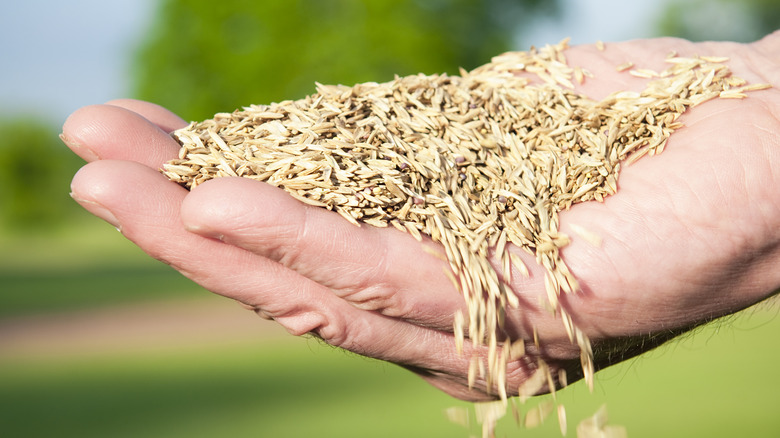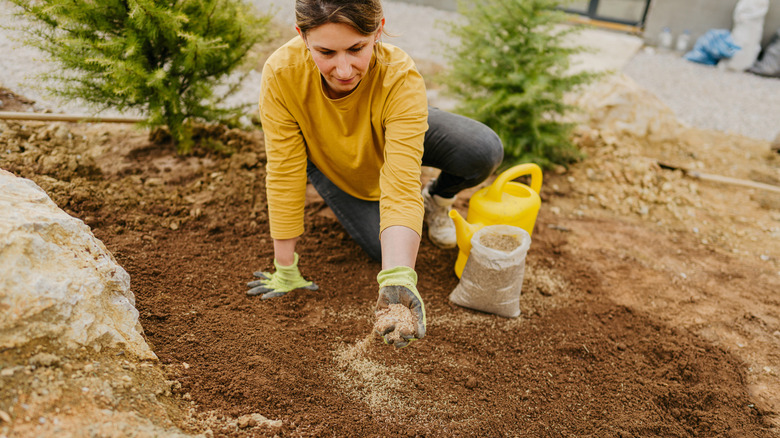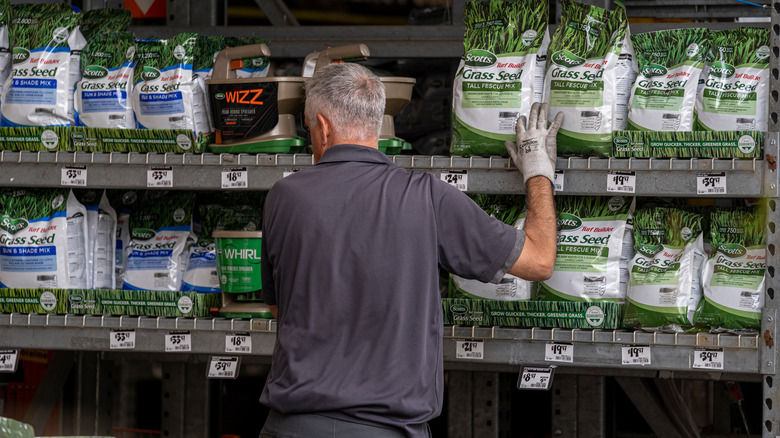The Best Time To Plant Grass Seed If You Live In The Midwest
Although it's called the Midwest, this group of states is really in the upper central portion of the United States, ranging from North Dakota to Ohio and down to Kansas and Missouri. The Midwest has some of the most widely-varied climate patterns of any North American region, with brutally cold and snowy winters and hot, wet summers. Because the Midwest frequently experiences dramatic cold snaps and heat waves, it can be difficult to determine when to plant grass or seed your lawn. Figuring out how to prevent lawn burn in the summer while ensuring grass seedlings don't freeze in winter can feel like a never-ending battle for people in the Midwest. We tend to think of lush, green lawns emerging in the late spring through summer, so many people are surprised to learn that the best time to spread grass seed in the Midwest is actually in the early fall.
The reason why you should plant grass seeds in the fall in the Midwest boils down to some basic seedling biology. Here's why grass seeds planted in fall thrive better in the Midwest, as well as some seed germination knowledge you can use to your advantage and other tips for ensuring a beautiful, lush, Midwestern lawn come summertime.
Seeding in fall is advantageous for the Midwest
To start germinating, grass seeds require soil temperatures above 50 degrees Fahrenheit, which usually doesn't occur until daytime air temperatures hover around 60 to 75 degrees — well into springtime for much of the Midwest. If you want your lawn to grow as fast and strong as possible before summer, it's best to spread seeds during the other perfect temperature window: early fall. Planting your grass seeds in late August through mid-September will ensure that the worst of the summer heat has died down, yet soil temperatures remain warm enough to encourage germination. In fall, weeds will also be less aggressive as opposed to spring. With several weeks to grow under these warm, mild conditions, your grass will be able to establish healthy roots before the first freeze of winter and come back strong in the spring.
However, if you're determined to plant some grass seeds in early spring, you can "trick" the seeds into thinking it's warmer outside than it actually is. To do this, dump a bag of lawn soil and a bag of seeds into a wheelbarrow, then thoroughly mix the soil and seeds together. Water the mixture just enough to dampen the soil, cover the wheelbarrow with a tarp or plastic trash bag to help the soil retain warmth, and allow it to rest in the garage for one to two weeks. Once the seeds begin germinating, you can spread them on your lawn to get a headstart.
Working with the natural climate
Planting your grass seeds at the right time is crucial in the Midwest, but it's not the only factor that can affect the health and appearance of your lawn. When preparing to seed your lawn, it's important to research and choose the right type of grass seeds. Some will grow flawlessly in Midwestern weather, while others will have you battling nature all year long. The best types of grass seeds for most Midwestern states include tall fescue, fine fescue, perennial ryegrass, and Kentucky bluegrass. These varieties tend to hold up well under the Midwest's brutal winters, and fescue is one of the best kind of lawns for shady backyards. Purchasing grass seed from your local nursery can be another smart choice, as many small nurseries offer native grass seeds and seed blends that will naturally thrive in Midwestern conditions.
While the dramatic changes in weather can make it difficult to grow grass and other plants, one advantage that the Midwest has for grass is its exceptionally-fertile soil. In many cases, you won't even need to use commercial fertilizer to see your lawn thrive on the naturally-fertile ground. However, you can apply a light layer of slow-releasing lawn food in early spring if desired.


